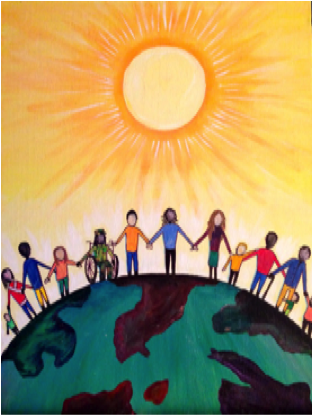TRI's Volunteer of the Year: Dr. Linda "Lindy" Grabbe
Linda Grabbe (known as “Lindy”) has been named TRI’s volunteer of the year.
Dr. Grabbe is a board-certified Family Nurse Practitioner and Psychiatric/Mental Health Nurse Practitioner. She is a Clinical Assistant Professor at Emory University’s Nell Hodgson Woodruff School of Nursing. Dr. Grabbe’s interests include trauma-informed care, the neurobiology of trauma and resilience, social justice, and social determinants of mental health. Her intellect and commitment to evidence-based research has made her a leader in pursuing research about models of intervention that can help the most marginalized of our society. Her clinical expertise is in primary care and mental health care for homeless or incarcerated women and youth, providing Community Resiliency Model (CRM) training to these populations in group settings.
Dr. Grabbe has many accomplishments and is a passionate advocate for the underserved. She is a healthcare provider with Community Advanced Practice Nurses, a small non-profit organization that operates a network of clinics in Atlanta homeless shelters for women, children, and youth. Her heart has no limit in how she cares for her community. She has expanded the reach of the CRM within Georgia and beyond by helping to sponsor teacher training programs through Emory University. TRI, through her efforts, has trained chaplains of the juvenile justice system, nurses, physicians, social workers, psychologists, chaplains of Children’s Hospital, individuals who were once homeless and more.
Dr. Grabbe’s interests include trauma-informed care, the neurobiology of trauma and resilience, social justice, and social determinants of mental health. Her current research includes measuring the impact of a brief Community Resiliency Model training on wellbeing of women in substance abuse treatment, as well as on wellbeing, resiliency, burnout, and effects of secondary traumatic stress in nurses, first responders, emergency department staff, and nursing students.
Dr. Grabbe recently shared her thoughts about the Community Resiliency Model:
What I love about the Community Resiliency Model is the fact that I can teach it quickly. People get an immediate benefit and they can share the techniques with others right away, so this ripple effect is going on all the time. The emotional self-regulation that comes with the Community Resiliency Model feels good—people have a way to sense if they are in the Resilient Zone and ways to get back into it when bounced out. The end product, if the individual chooses to practice the Community Resiliency Model, is better body-brain communication and increased sense of well-being. It is all about listening to the body. It is magical to witness the shift that occurs when someone accesses a resource that comes from within and can sense strength and well-being in a deeply physical way.
We have found improved control of emotions in incarcerated teens and women trauma survivors in drug treatment. We also found that professional groups such as nurses and physicians benefit from using the skills because their secondary traumatic stress is reduced.
I love that the Community Resiliency Model is exquisitely trauma-sensitive. Given that the majority of persons have experienced traumatic stress in childhood, the Community Resiliency Model makes perfect sense as a public health, mental wellness intervention. Always invitational, people only have to try what they are comfortable with. Having trained or done workshops in multiple trauma therapies as a psychiatric nurse practitioner, I recognize the simplicity of the Community Resiliency Model as important and value its body-based approach to understanding the impact of and responses to, stress and trauma. The Community Resiliency Model normalizes and destigmatizes our unhealthy behaviors and stress responses, but also gives us several means to deal with our problems in a healthy, resilient manner.
One of my favorite moments was when a group of us taught 100 women police officers and dispatchers from all over Georgia, and after a 4-hour the Community Resiliency Model introductory class, one individual said we probably had saved some lives that day. It has been a privilege to teach the Community Resiliency Model, and every time we teach it, it is like giving a gift.

